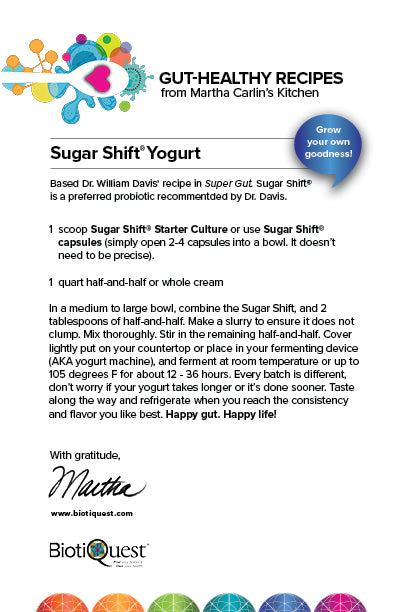
BLOG

BiotiQuest® Gut Health & Probiotics Blog with Martha Carlin

Why CoQ10 Production Depends on Microbial Balan...
 Martha Carlin | Feb 23, 2026 |
Martha Carlin | Feb 23, 2026 |
CoQ10 supports cellular energy and antioxidant balance. Discover how microbial health—including Lactobacillus plantarum—may influence CoQ10 production.
Why CoQ10 Production Depends on Microbial Balan...
CoQ10 supports cellular energy and antioxidant balance. Discover how microbial health—including Lactobacillus plantarum—may influence CoQ10 production.

160: Your Gut Health Affects Your Brain, Sleep,...
 Martha Carlin | Feb 04, 2026 |
podcast
Martha Carlin | Feb 04, 2026 |
podcast
The conversation examines how gut health is connected to chronic conditions such as leaky gut, Parkinson’s disease, diabetes, and inflammation. We also discuss how everyday lifestyle factors can either support...
160: Your Gut Health Affects Your Brain, Sleep,...
The conversation examines how gut health is connected to chronic conditions such as leaky gut, Parkinson’s disease, diabetes, and inflammation. We also discuss how everyday lifestyle factors can either support or disrupt the gut, including:

How the Gut Microbiome Influences Nitric Oxide ...
 Martha Carlin | Feb 03, 2026 |
Martha Carlin | Feb 03, 2026 |
Nitric oxide isn’t something you simply boost. Learn how the gut microbiome shapes the conditions that allow nitric oxide signaling, flow, and vascular resilience to emerge naturally.
How the Gut Microbiome Influences Nitric Oxide ...
Nitric oxide isn’t something you simply boost. Learn how the gut microbiome shapes the conditions that allow nitric oxide signaling, flow, and vascular resilience to emerge naturally.

Are the Bacteria in Your Gut Causing Anxiety an...
 Martha Carlin | Jan 26, 2026 |
podcast
Martha Carlin | Jan 26, 2026 |
podcast
Martha brings her unique perspective as both a systems thinker and scientific innovator to help viewers understand how restoring balance in the gut can transform the entire terrain of the...
Are the Bacteria in Your Gut Causing Anxiety an...
Martha brings her unique perspective as both a systems thinker and scientific innovator to help viewers understand how restoring balance in the gut can transform the entire terrain of the body—and potentially reverse the course of chronic illness.

Introducing the BiotiQuest Community Learning Lab
 Martha Carlin | Jan 22, 2026 |
Martha Carlin | Jan 22, 2026 |
In the new Community Learning Lab, we’ll share research, stories, observations, and questions. We’ll connect emerging microbiome science with real-life application, always with transparency, curiosity, and respect for the body’s...
Introducing the BiotiQuest Community Learning Lab
In the new Community Learning Lab, we’ll share research, stories, observations, and questions. We’ll connect emerging microbiome science with real-life application, always with transparency, curiosity, and respect for the body’s innate intelligence. Join us today!

Hot Mess or Gut Stress with Martha Carlin | Epi...
 Martha Carlin | Jan 22, 2026 |
podcast
Martha Carlin | Jan 22, 2026 |
podcast
In this episode, we delve into the fascinating world of gut health with microbiome researcher and health innovator, Martha Carlin. As the founder of The BioCollective, Martha’s dedicated her career...
Hot Mess or Gut Stress with Martha Carlin | Epi...
In this episode, we delve into the fascinating world of gut health with microbiome researcher and health innovator, Martha Carlin. As the founder of The BioCollective, Martha’s dedicated her career to understanding how gut health, blood sugar balance, and environmental...

Waking Up to a Probiotic Breakfast Can Do Wonders for Your Gut Health
Did you know that recent studies show people with poor gut diversity had lower quality of life? The health of your microbiome impacts your mental health, sleep, energy, the risk for chronic illnesses, and much more. A probiotic breakfast can...

Can Probiotic Supplements Make or Break Your Fast?
Intermittent fasting (IF) may have started as a fitness trend for weight loss, but today it's a go-to lifestyle choice for many. Practicing intermittent fasting has been linked with health benefits such as lowering blood sugar and insulin, preventing heart...



























